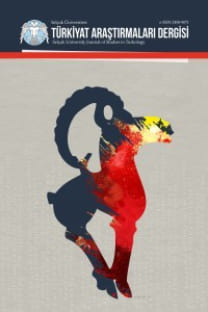KİNCİ DÜNYA SAVAŞINDA TÜRK DIŞ POLİTİKASI: TARAFSIZLIK, DİPLOMASİ VE DEVLET YÖNETİMİ
Dış Politika, , Tarafsızlık, , Diplomasi ve Devlet İdaresi
TURKISH FOREIGN POLICY DURING THE SECOND WORLD WAR: NEUTRALITY, DIPLOMACY AND STATECRAFT
Foreign Policy, Neutrality, , Diplomacy and Statecraft.,
___
- Armaoğlu, Fahir (1958), ‘İkinci Dünya Harbi’nde Türkiye’, Siyasal Bilgiler Fakültesi Dergisi, Vol.13, 136-58.
- Ataöv, Türkkaya (1965), Turkish Foreign Policy 1939-1945, Ankara: SBF.
- Atlı, Cengiz (2014) “Türkiye’de II. Dünya Savaşı Sırasında İngiliz ve Alman Büyükelçilerine Suikast Girişimi”, International Journal of Social Science, 28, Autumn II, 55-71.
- Avcı, Ayşegül (2015), “Winning the War of Perception: American Attempts to Counter Germany's Military Influence in Turkey during World War II, Turkish Studies, Vol.17, 1, 202-219.
- Aydemir, Şevket Süreyya (1979), İkinci Adam, Vol 2, İstanbul: Remzi.
- Baxter, Christopher (2008), “Forgeries and Spies: The Foreign Office and the ‘Cicero’ Case”, Intelligence and National Security, Vol. 23, No. 6, 807-826.
- Bezci, Egemen B. (2016), “Turkey’s intelligence diplomacy during the Second World War”, Journal of Intelligence History, Vol.15 No.2, 1-16.
- Çalış, Şaban H. (2017), Turkey’s Cold War: Foreign Policy and Western Alignment in the Modern Republic, London: I.B. Tauris, 2017.
- Çalış, Şaban H. (1999), ‘’Turkey's Search for Security and the Soviet Factor During the Second World War", S.Ü. Sosyal Bilimler MYO Dergisi, Sayı 3, 1999, 73-110;
- Çalış, Şaban H. (1997), ‘’Pan-Turkism and Europeanism: A note on Turkey’s pro-German Neutrality during the Second World War’’, Central Asian Survey, Vol.16, No.1, March 1997, 103-114.
- Deringil, Selim (1989), Turkish Foreign Policy During World War II: An ‘Active Neutrality’, Cambridge: Cambridge University Press.
- DGFP (1961), Documents on German Foreign Policy 1918-1945, Series D 1937-1945, The War Years-September 1, 1940/January 31, 1941, Vol. XI, London: HMSO.
- DGFP (1964), Documents on German Foreign Policy 1918-1945, Series D, The War Years-June 23, 1941/December 11, 1941, Vol. XIII, London: HMSO.
- Esmer, Ahmet Şükrü And Oral Sander (1991), ‘İkinci Dünya Savaşında Türk Dış Politikası’, In Mehmet Gönlübol et. al, Olaylarla Türk Dış Politikası, Alkım: Ankara.
- FRUS (Foreign Relations of the US) (1968), The Conferences at Washington, 191-1942 and Casablanca, 1943, Washington: Government Printing Office.
- Gülmez, Nurettin ve Ceyhun Demirkollu, (2013), “Bir İstihbarat Savaşı: Çiçero Olayı” CBÜ Sosyal Bilimler Dergisi, Cilt :11, Sayı :2, 414-430.
- Gürün, Kamuran (1965), Türk-Sovyet İlişkileri (1920-1953), Anakara: TTK.
- Howard, Harry N. (1974), Turkey, The Straits and Us Policy, Baltimore, MD: Johns Hopkins University Press.
- ISSN: 1300-5766
- Yayın Aralığı: Yılda 3 Sayı
- Başlangıç: 1994
- Yayıncı: Selçuk Üniversitesi
BETWEEN LIFE AND DEATH: SLAVES AND VIOLENCE IN CRIMEAN SOCIETY IN THE LAST QUARTER OF 17TH CENTURY
TİMUR’UN MUTASAVVIFLARLA İLİŞKİLERİ
İzzetullah ZEKİ, Mustafa AKKUŞ
ESKİ UYGURCA DÖRT BRAHMAN ÖYKÜSÜNDEN BİR PARÇA
DERLEME SÖZLÜĞÜ’NDE GEÇEN “SABAN” İLE İLGİLİ KELİMELER
DEMOKRAT PARTİ İKTİDARINDA İBRAHİM ETEM MENDERES’İN İÇİŞLERİ BAKANLIĞI DÖNEMLERİ
HAZARALARIN ŞİİLEŞMESİNDE SAFEVİ ETKİSİ
XVI. YÜZYILIN ORTALARINDA İLTİZAM SİSTEMİNİN YAYGINLIĞI: LÂRENDE KAZASI ÖRNEĞİ
HAYVAN BENZETMECELERİNE DAYALI DEVE OYUNLARINA DAİR BİR DEĞERLENDİRME
SOVYET BASININDA TÜRKİYE VE TÜRKİYE CUMHURİYETİ’NİN İLANI: PRAVDA VE İZVESTİYA GAZETELERİ ÖRNEĞİ
Banu ERDOĞAN ÇAKAR, Aslı YURDİGÜL
ESKİ UYGURCA CHENG WEISHI LUN TEFSİRİNE İLİŞKİN FRAGMANLAR (6. VE 8. YAPRAKLAR)
